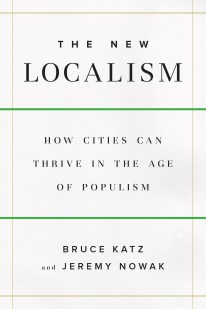Across the country, a movement of local doers is taking hold — one where problem solving happens from the bottom up instead of the top down. We’re seeing this in everything from the way we educate ourselves to the tools we use to get places. The energy is coming not just from governments but also business leaders, teachers and scientists, and the solutions are interdisciplinary, too. This is what Bruce Katz, Centennial Scholar at the Brookings Institution, argues in new book, co-authored with Jeremy Nowak, The New Localism: How Cities Can Thrive in the Age of Populism.
The historic mechanisms that centralized solutions to issues like housing affordability (i.e. federal home loans, suburbanization, etc.) are finally being recognized for their flaws, and we’re beginning to find a balance with local control over these challenges once again, says Katz.
 Katz believes that “networked” solutions where people from different sectors work together will create a better future for all of us. These sorts of solutions often come out of cities, but even those in rural areas can apply these ideas to build great places, attract great people and strengthen their economies.
Katz believes that “networked” solutions where people from different sectors work together will create a better future for all of us. These sorts of solutions often come out of cities, but even those in rural areas can apply these ideas to build great places, attract great people and strengthen their economies.
This “new localism” has been triggered by the same economic and cultural forces that brought about the current populist movement, particularly evident in the election of Donald Trump and particularly felt in rural areas. However, Katz sees the new localism as an antidote to the more vitriolic and prejudiced side of modern populism because it empowers local leaders of all backgrounds to champion their communities’ concerns.
Katz argues that the federal government still has a definite role to play in issues like civil rights, but that bottom-up solutions will create the most lasting change and that we can’t hang our hopes on one perfect national leader or policy. Furthermore, he sees the new localism as a way to move beyond the left-right divide in America and toward an economically successful future.
“We have agency at the local level,” says Katz. “We have more wealth and capacity than we know when we really do pull together these different sectors and a more diverse leadership structure… It’s just a different way of thinking about how our problems can be solved.”
Listen to Podcast